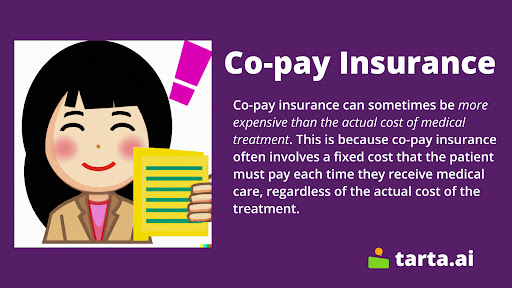Co-pay Insurance: What Do You Need It For?

PHOTO: ewmotiontherapy.com
What is Co-pay Insurance?
Co-pay insurance, also known as co-insurance, is a type of health insurance plan where the policyholder shares the cost of healthcare expenses with the insurance company. Under a co-pay insurance plan, the policyholder is required to pay a predetermined amount of the cost of medical services or prescription drugs, while the insurance company covers the rest of the cost.
For example, if you have a $20 co-pay for a doctor's office visit, you would pay $20 at the time of the visit, and the insurance company would pay the remaining cost of the visit. Similarly, if you have a $50 co-pay for a prescription drug, you would pay $50 for the medication, and the insurance company would pay the remaining cost.
Co-pay insurance plans are often structured so that the policyholder pays a lower monthly premium in exchange for sharing a portion of the cost of medical care. This type of insurance plan can be beneficial for individuals who have regular healthcare needs but do not want to pay the full cost of healthcare expenses out-of-pocket.
What are the co-pay insurance benefits?
- Predictable healthcare costs: With a co-pay insurance plan, you know in advance how much you will need to pay for medical services or prescription drugs. This can help you budget for healthcare expenses and avoid unexpected bills.
- Lower out-of-pocket costs: Co-pay insurance plans can help lower your out-of-pocket costs for medical care. You will only be responsible for paying the co-pay amount, while the insurance company covers the rest of the cost.
- Access to medical care: Co-pay insurance plans can help make medical care more affordable and accessible. With lower out-of-pocket costs, you may be more likely to seek medical care when you need it.
- Incentives for cost-saving behavior: Co-pay insurance plans can encourage policyholders to seek out lower-cost healthcare options. For example, you may be more likely to choose a generic prescription drug over a brand-name drug if you have a lower co-pay for the generic.
- More affordable premiums: Co-pay insurance plans often have lower monthly premiums than other types of health insurance plans. This can make them a more affordable option for individuals and families who need health insurance coverage.
What are co-pay insurance limitations?
While there are benefits to having a co-pay insurance plan, there are also some limitations to consider. Some of these limitations include:
- Higher overall healthcare costs: Co-pay insurance plans can result in higher overall healthcare costs for individuals and families. While the co-pay amount may be lower than the full cost of medical services or prescription drugs, the insurance company is still responsible for paying a significant portion of the cost. This can result in higher premiums and overall healthcare costs.
- Limited choices: Co-pay insurance plans may have limited networks of healthcare providers and facilities that are covered under the plan. This can limit your choices for medical care and make it more difficult to find a provider that meets your needs.
- Less flexibility: Co-pay insurance plans may have more restrictions on when and where you can receive medical care. For example, you may need to get pre-authorization from the insurance company before you can receive certain medical services.
- Limited coverage for certain services: Co-pay insurance plans may not cover certain medical services, such as vision and dental care, or may only cover them up to a certain amount. This can result in higher out-of-pocket costs for these types of services.
- Cost-sharing responsibilities: With a co-pay insurance plan, you are responsible for paying the co-pay amount for medical services or prescription drugs. This means that you will still need to pay a portion of the cost of healthcare expenses, even with insurance coverage.
What is the cost of Co-pay insurance?
The cost of co-pay insurance varies depending on several factors, including your age, health status, location, and the level of coverage you select. Generally, co-pay insurance plans have lower monthly premiums than other types of health insurance plans, such as high-deductible health plans (HDHPs) or traditional fee-for-service plans. However, co-pay insurance plans also typically have higher out-of-pocket costs for medical services and prescription drugs.
When you enroll in a co-pay insurance plan, you will be responsible for paying a predetermined amount of the cost of medical services or prescription drugs at the time of service. This co-pay amount can vary depending on the specific plan you select and the type of service you receive. For example, you may have a $20 co-pay for a doctor's office visit or a $50 co-pay for a specialist visit.
In addition to the co-pay amount, you may also be responsible for paying an annual deductible, which is the amount you must pay out-of-pocket before your insurance coverage kicks in. Co-pay insurance plans may also have coinsurance requirements, which means that you may be responsible for paying a percentage of the cost of medical services after you have met your deductible.
Overall, the cost of co-pay insurance depends on several factors, including the specific plan you select, your healthcare needs, and your budget. It is important to carefully compare different health insurance plans and consider the costs and benefits of each plan before making a decision.

What is the coverage of co-pay insurance?
The coverage of co-pay insurance varies depending on the specific plan you select. Generally, co-pay insurance plans cover a range of medical services and prescription drugs, including:
- Doctor visits: Co-pay insurance plans typically cover visits to primary care doctors, specialists, and urgent care centers.
- Prescription drugs: Co-pay insurance plans often cover a range of prescription drugs, including generic and brand-name drugs.
- Hospitalization: Co-pay insurance plans may cover inpatient hospital stays, as well as outpatient procedures and surgeries.
- Diagnostic tests and procedures: Co-pay insurance plans may cover a range of diagnostic tests and procedures, such as blood tests, X-rays, and MRIs.
- Preventive care: Co-pay insurance plans may cover preventive care services, such as annual physical exams, immunizations, and cancer screenings.
- Mental health and substance abuse treatment: Co-pay insurance plans may cover mental health services and substance abuse treatment, including outpatient counseling and inpatient rehabilitation.
It is important to note that the specific coverage of co-pay insurance plans can vary widely depending on the plan you select. Some plans may have more limited coverage for certain services or may require prior authorization before certain services are covered. It is important to carefully review the coverage details of any health insurance plan you are considering and ask questions if you are unsure about what is covered.
NOTE
Out-of-pocket maximum: Co-pay insurance plans usually have an out-of-pocket maximum, which is the maximum amount you will pay out-of-pocket for covered medical expenses in a given year. Once you reach this limit, the insurance plan will typically cover the remaining costs of covered services.
What specialists usually use Co-pay insurance?
- Primary care physicians: These doctors provide routine medical care, such as check-ups and screenings, and may refer patients to specialists as needed.
- Mental health providers: Co-pay insurance plans may cover visits to mental health providers, such as psychiatrists, psychologists, and licensed clinical social workers.
- Substance abuse treatment providers: Co-pay insurance plans may cover visits to substance abuse treatment providers, such as addiction counselors and rehabilitation centers.
- Urgent care clinics: Co-pay insurance plans may cover visits to urgent care clinics for minor illnesses or injuries.
- Specialists: Co-pay insurance plans typically cover visits to medical specialists, which can include primary care physicians, dermatologists, neurologists, cardiologists, gastroenterologists, psychiatrists, psychologists, and other mental health professionals.
It's important to note that the specific specialists and providers covered under a co-pay insurance plan may vary depending on the plan and the network of providers associated with it. It's a good idea to check with the insurance company or review the plan details to see which providers are covered before making an appointment.
- Co-pay insurance is a type of health insurance that requires the insured to pay a fixed amount of money (the co-pay) each time they receive medical care.
- The purpose of co-pay insurance is to reduce the overall cost of healthcare by encouraging individuals to seek necessary medical care, while also providing a financial incentive to use cost-effective options.
- Co-pay insurance plans may have different co-pay amounts for different types of medical care, such as primary care visits, specialist visits, and prescription drugs.
- Co-pay amounts can vary widely between insurance plans, so it's important to carefully review plan details when choosing a policy.
- Some co-pay insurance plans may have an annual limit on the total amount of co-pays that the insured individual is responsible for paying.
- Co-pay insurance plans can be beneficial for individuals who need frequent medical care or who have chronic conditions that require ongoing treatment.
FAQ
Q: What is co-pay insurance?
A: Co-pay insurance is a type of health insurance plan that requires the policyholder to pay a predetermined amount of the cost of medical services or prescription drugs at the time of service.
Q: What are the benefits of co-pay insurance?
A: The benefits of co-pay insurance include predictable healthcare costs, lower out-of-pocket costs, access to medical care, incentives for cost-saving behavior, and more affordable premiums.
Q: What are the limitations of co-pay insurance?
A: The limitations of co-pay insurance include higher overall healthcare costs, limited choices, less flexibility, limited coverage for certain services, and cost-sharing responsibilities.
Q: How much does co-pay insurance cost?
A: The cost of co-pay insurance varies depending on several factors, including your age, health status, location, and the level of coverage you select.
Q: What does co-pay insurance cover?
A: Co-pay insurance plans typically cover a range of medical services and prescription drugs, including doctor visits, prescription drugs, hospitalization, diagnostic tests and procedures, preventive care, and mental health and substance abuse treatment.
Q: Can co-pay insurance plans have limited networks of healthcare providers?
A: Yes, co-pay insurance plans may have limited networks of healthcare providers and facilities that are covered under the plan. This can limit your choices for medical care and make it more difficult to find a provider that meets your needs